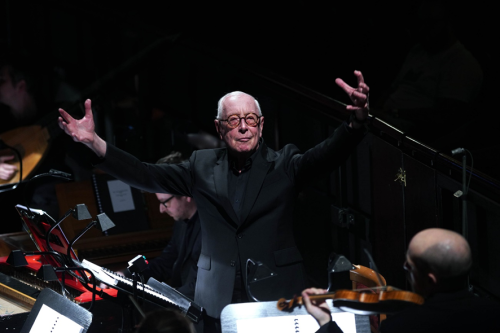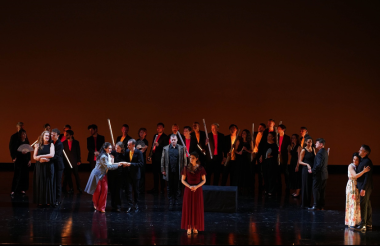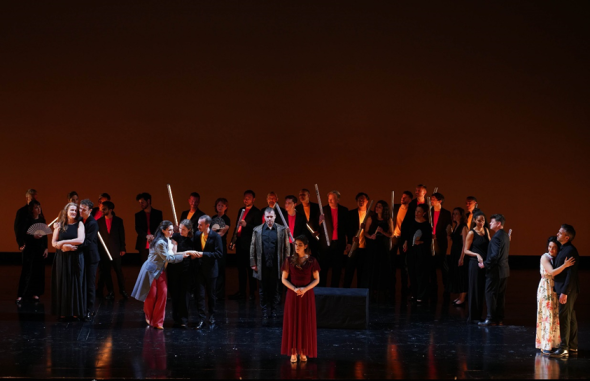 Spain Charpentier, Médée: Chorus and Orchestra of Les Arts Florissants / William Christie (conductor). Teatro Real, Madrid, 6.6.2024. (JMI)
Spain Charpentier, Médée: Chorus and Orchestra of Les Arts Florissants / William Christie (conductor). Teatro Real, Madrid, 6.6.2024. (JMI)

Semi-staged production:
Director – Marie Lambert-Le Bihan
Lighting – Fiammetta Baldiserri
Cast:
Médée – Véronique Gens
Jason – Reinoud Van Mechelen
Créon – Cyril Costanzo
Créuse – Ana Vieira Leite
Oronte – Marc Mauillon
Nérine – Emmanuelle de Negri
Cléone – Élodie Fonnard
Arcas – Lisandro Abadie
Amour – Lucía Martín-Cartón
The myth of Medea, which has its origin in Euripides, has been brought to the stage on many occasions – in the world of opera, a dozen works have been dedicated to this Greek tragedy. Without a doubt, the most famous of all of them is by Luigi Cherubini: the great interpretation by the immortal Maria Callas in the mid-twentieth century had a lot to do with this.
If Cherubini’s version is the most famous, the oldest opera about Medea is the one done at the Teatro Real. Written by Marc-Antoine Charpentier, it premiered in 1693. This Médée could be seen recently at the Palais Garnier, but here in Madrid it was semi-staged and with a different cast than in Paris.

When a semi-staged opera is announced, one assumes that it will be a concert version with some movement on the stage which generally adds little to the traditional concert. This was not the case here – we enjoyed a much better production than usual due to stage director and lighting specialist Marie Lambert-Le Bihan. No one used a score, and there was excellent movement on the stage. The actors were carefully directed, the plot was well-narrated and great use was made of the lighting. It can be said that it was only the decoration a set provides which was missing. I have seen fully-staged performances that were inferior to what was offered here.
The great interest of this Médée lay in the presence in the pit of William Christie and Les Arts Florissants. He had just given a number of staged performances at the Palais Garnier and with great success. Christie has shown once again that he is one of the great – if not the greatest – current conductors of Baroque music. Médée is a long opera (almost three hours of music), and in others’ hands the result can be tedious. Fortunately, what came from the Teatro Real pit was of great quality and highly enjoyable. It is also worth highlighting the work of the Les Arts Florissants Chorus. Another detail: Christie added some pages of music in the second part of the opera that were not heard in Paris and amounted to about ten minutes of music.
The cast was different than the one heard in Paris, and voices were the weakest part of this performance.
Médée was played by French soprano Véronique Gens, who was by far the best singer in the cast. I had some doubts about how she would do – I had not seen and heard her for several years. However, she was convincing in every way and gave life and credibility to this tragic character.
As in Paris, tenor Reinoud Van Mechelen played the part of Jason. I find his voice insufficient although he is a good performer. In my opinion, another singer was needed. King Créon was sung by baritone Cyril Costanzo. I missed hearing a true bass in the role and a better voice than his, although he too is good on stage.
Créuse, the object of desire for both Jason and Oronte, was soprano Ana Vieira Leite, who had been in the Paris cast. She is a light soprano with a pleasant voice, but her singing seemed a bit monotonous to me. Oronte, the Prince of Argos, was baritone Marc Mauillon, and I did not find his voice particularly attractive.
Mezzo-soprano Emmanuelle de Negri did well as Nérine, and soprano Lucía Martín-Cartón as Amour made a good impression. Elodie Fonnard as Cléone and Lisandro Abadie as Arcas were correct in their roles.
José M. Irurzun
